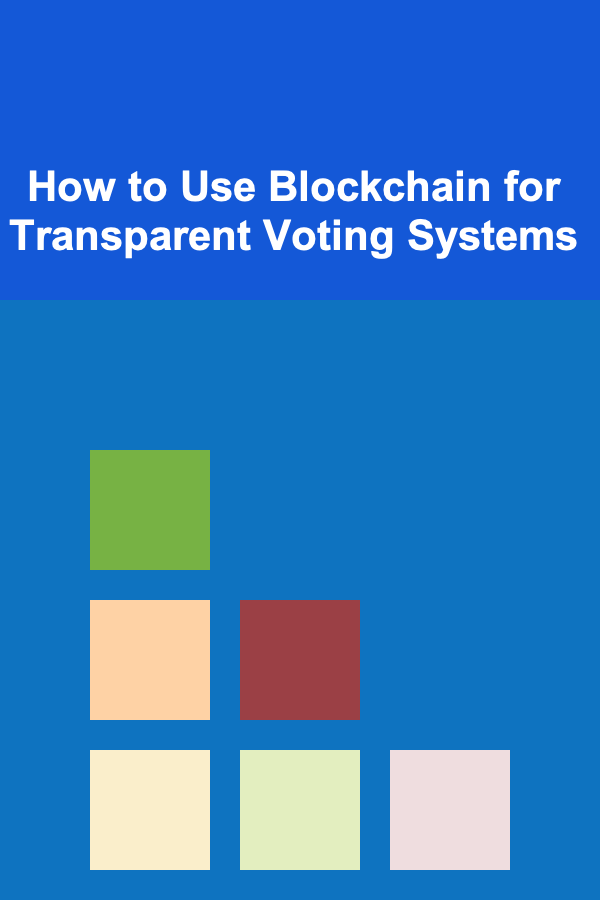
How to Use Blockchain for Transparent Voting Systems
ebook include PDF & Audio bundle (Micro Guide)
$12.99$8.99
Limited Time Offer! Order within the next:

In recent years, the notion of blockchain has expanded beyond the realms of cryptocurrency and has begun to revolutionize various industries, including governance, finance, and logistics. One of the most promising applications of blockchain technology is its potential to create transparent, secure, and efficient voting systems. Voting is a foundational pillar of democracy, but issues such as fraud, tampering, lack of transparency, and accessibility remain persistent challenges. Blockchain technology, with its decentralized, immutable, and transparent nature, offers an elegant solution to these problems.
This article delves into the concept of using blockchain for transparent voting systems, explaining the underlying technology, its potential benefits, challenges, and real-world applications.
What is Blockchain?
At its core, blockchain is a decentralized ledger technology that enables secure, transparent, and immutable record-keeping. It works by storing data in blocks, which are linked together in a chain. Each block contains a set of transactions and is cryptographically sealed, ensuring that once data is recorded, it cannot be altered or deleted without the consensus of the network.
The key features of blockchain include:
- Decentralization: Unlike traditional systems where a central authority has control over data, blockchain operates on a distributed network of nodes, making it resistant to censorship and centralized corruption.
- Immutability: Once information is added to the blockchain, it cannot be altered or erased. This guarantees that the voting record remains unchanged.
- Transparency: All participants in the network can view the data, promoting trust and accountability.
- Security: Blockchain uses cryptographic techniques to ensure that data is secure and protected from tampering.
Challenges of Traditional Voting Systems
Before diving into how blockchain can solve the challenges in voting systems, let's first examine the common issues associated with traditional voting methods:
1. Voter Fraud
Voter fraud is a significant concern in many countries, whether it involves illegal voting, ballot tampering, or vote buying. In paper-based systems, the physical ballots can be altered or destroyed, while in electronic voting systems, vulnerabilities like hacking or manipulation can occur.
2. Lack of Transparency
Traditional voting systems often lack transparency, leaving voters uncertain about how their votes are counted and whether the election results reflect the will of the people. Centralized election bodies control the counting and reporting of votes, which can create opportunities for manipulation or errors.
3. Accessibility
In many regions, voters face challenges in accessing polling stations, especially in rural or remote areas. Additionally, people with disabilities, the elderly, and those in conflict zones may find it difficult to cast their votes, leading to disenfranchisement.
4. Complexity and Cost
Traditional voting systems can be costly to organize. Printing ballots, staffing polling stations, and employing election officers all require significant financial resources. Moreover, the complexity of tallying votes can delay results and create room for mistakes or disputes.
5. Security Concerns
While digital voting systems have the potential to streamline the voting process, they also introduce the risk of cyberattacks, hacking, and data breaches. Malicious actors could target electronic voting systems to alter election results.
Blockchain as a Solution
Blockchain's features align well with the needs of modern voting systems. By leveraging blockchain technology, voting can become more secure, transparent, and accessible. Here's a detailed look at how blockchain can address the challenges in traditional voting systems.
1. Security and Immutability
Blockchain's decentralized nature ensures that no single entity controls the vote tallying process, reducing the risk of manipulation. Once a vote is cast, it is recorded in a block, and this block is cryptographically sealed, making it nearly impossible for anyone to alter the vote. Even if a malicious actor gains control of part of the network, altering past votes would require modifying every block in the chain, which is computationally infeasible. This creates an incorruptible record of the election process.
2. Transparency and Audibility
Blockchain allows for the full transparency of the voting process. Once a vote is cast and recorded on the blockchain, it is publicly visible, allowing anyone to audit the results. The transparency provided by blockchain allows voters to independently verify their votes, increasing trust in the process. Moreover, the entire voting history is available for scrutiny, making it easier to detect any potential errors or discrepancies.
3. Voter Privacy and Anonymity
While transparency is crucial for verifying the voting process, voter privacy is equally important. Blockchain can achieve both by using cryptographic techniques such as zero-knowledge proofs (ZKPs) or homomorphic encryption to ensure that while the vote itself is recorded transparently, the identity of the voter remains anonymous. This ensures that votes can be independently verified without compromising the voter's privacy.
4. Decentralized Control
Blockchain's decentralized nature means that no single authority or entity has full control over the voting system. This is particularly important in preventing voter suppression, fraud, or manipulation by central authorities. Since all participants in the blockchain network can verify the data, the system is inherently resistant to centralized control, making it more democratic.
5. Cost-Effectiveness
By moving to a blockchain-based system, the cost of organizing elections can be drastically reduced. Traditional voting systems often require expensive infrastructure, including physical polling stations, ballot printing, and manual vote counting. Blockchain systems eliminate the need for these intermediaries, reducing both the direct and operational costs associated with elections.
6. Accessibility
Blockchain-based voting systems can provide an accessible platform for people who might otherwise struggle to vote. Online voting platforms built on blockchain can allow remote voting, enabling people from remote areas or those with disabilities to vote securely from their homes. This could dramatically increase voter turnout, especially in regions with difficult access to traditional polling stations.
How Blockchain Voting Systems Work
A blockchain-based voting system works through several key steps:
1. Voter Registration
In a blockchain-based voting system, voter registration can be managed using identity verification tools. Voter identities can be stored on a public or private blockchain ledger to ensure that each individual can vote only once. This can be done through cryptographic techniques such as public-key cryptography, where a unique public key represents each voter.
2. Casting Votes
When a voter casts their vote, the information is encrypted and stored as a transaction on the blockchain. The vote can be encrypted in a way that allows only authorized parties to view the outcome (such as the election commission), preserving the voter's privacy.
3. Vote Recording
Once a vote is cast, it is added to a block of transactions, and this block is appended to the blockchain. The vote is immutable, meaning it cannot be changed or tampered with once recorded. The block is then distributed across the entire network, ensuring that all participants have an identical, up-to-date version of the ledger.
4. Tallying Votes
Once voting is complete, the votes can be automatically tallied by the blockchain network. Since the entire voting history is recorded transparently, anyone can verify the results, ensuring that the vote count is accurate and has not been tampered with.
5. Results Verification and Auditing
Because the blockchain ledger is publicly available, any participant in the network can audit the votes and verify that they have been counted correctly. Additionally, blockchain enables transparency during the entire election process, reducing the risk of fraud or errors.
Real-World Applications of Blockchain in Voting
Several initiatives have already begun exploring the use of blockchain in voting systems. Here are a few examples:
1. Estonia's e-Residency Program
Estonia is one of the most advanced countries when it comes to e-governance, and the country has already implemented digital voting systems. While their system is not fully based on blockchain, Estonia is exploring the use of blockchain for increasing the security and transparency of its e-voting system. The government's digital infrastructure could be significantly enhanced by incorporating blockchain to ensure that votes are immutable and auditable.
2. Voatz: A Blockchain Voting Platform
Voatz is a mobile voting platform that uses blockchain to secure and validate votes. It has been used in small-scale elections in the United States, including municipal elections and even in some overseas voting processes for the U.S. military. Voatz uses blockchain to ensure the integrity of votes, prevent fraud, and provide transparent results.
3. Swiss Post's Blockchain Voting Trial
The Swiss Post, in collaboration with several universities, has conducted a blockchain voting trial for citizens to vote remotely. The pilot project aimed to demonstrate that blockchain could offer a secure and verifiable voting experience for citizens who may have difficulty attending traditional polling stations.
4. West Virginia's Blockchain Voting Pilot
West Virginia, in the U.S., conducted a pilot program in the 2018 elections, allowing military personnel to vote via blockchain-based mobile applications. The project was considered a success, with a secure, verifiable method of voting for service members deployed abroad.
Challenges and Concerns with Blockchain Voting
Despite the promising potential of blockchain in voting, several challenges must be addressed before it becomes widely adopted:
1. Technical Barriers
Implementing blockchain-based voting systems requires significant technical expertise, infrastructure, and resources. The need for secure hardware and software solutions may be a barrier for many countries, particularly those with limited resources.
2. Voter Education and Trust
Many voters may be unfamiliar with blockchain technology, and thus educating the public on its benefits and security features will be crucial for the success of blockchain voting systems. Ensuring voter trust in the system will require careful management of security risks and transparency.
3. Privacy Concerns
While blockchain can offer transparency, it must also protect voter privacy. Striking the right balance between transparency and anonymity is a key challenge, as improper handling of voter data could lead to privacy violations.
4. Legal and Regulatory Framework
Governments and electoral bodies must create legal frameworks that allow for the use of blockchain in voting while ensuring that the process complies with existing laws and regulations. This may require changes in electoral laws, as well as new regulations surrounding cybersecurity and data privacy.
Conclusion
Blockchain technology holds the potential to significantly improve the transparency, security, and efficiency of voting systems worldwide. By providing a decentralized, transparent, and immutable record of votes, blockchain can help reduce fraud, increase voter confidence, and make voting more accessible. While there are still challenges to overcome, such as technical barriers and privacy concerns, the future of blockchain-based voting looks promising. As countries and organizations continue to explore this innovative technology, it is likely that blockchain will play an increasingly vital role in shaping the future of elections and democratic processes.

How to Create an Enrichment Space for Your Pet in Small Homes
Read More
How to Embrace Thrifty Shopping Without Compromising on Style
Read More
How to Make the Most of Corner Spaces in Your Garage
Read More
How to Work with Hotels and Resorts for Paid Photography Opportunities
Read More
The Art of Time Management: How to Stand Out by Making the Most of Your Day
Read More
How To Master Your Perceptions: A Stoic Guide
Read MoreOther Products

How to Create an Enrichment Space for Your Pet in Small Homes
Read More
How to Embrace Thrifty Shopping Without Compromising on Style
Read More
How to Make the Most of Corner Spaces in Your Garage
Read More
How to Work with Hotels and Resorts for Paid Photography Opportunities
Read More
The Art of Time Management: How to Stand Out by Making the Most of Your Day
Read More